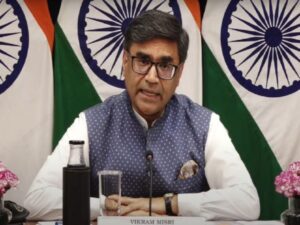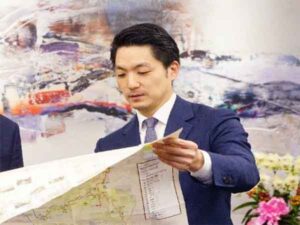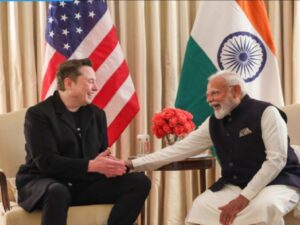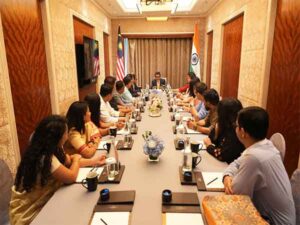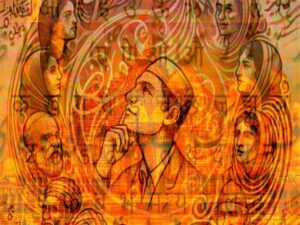How Xi Jinping reinforced his control over China at a crucial meeting
Beijing [China], March 7 (ANI): Li Keqiang, China’s outgoing premier, made an effort to position himself as Xi Jinping’s ideological rival during his final year in office. At his final significant speech on Sunday, it was evident he had failed, reported The Sydney Morning Herald.
The Chinese Communist Party and Xi Jinping are now at the centre of the Chinese government’s efforts to consolidate power, uniting the state with the party and the party with Xi. Li spoke for an hour to the National People’s Congress on Sunday in Beijing, mentioning Xi Jinping a record 17 times as opposed to five times in his first speech in 2014. Former Chinese premier Wen Jiabao did not once mention outgoing President Hu Jintao in his final speech in 2013. After almost ten years in office, he was name-checked twice in 2012. Repetition is useful in the opaque world of Chinese elite politics, where language is weighed and obscured by lofty metaphors. Likewise, omission.
According to a report in The Sydney Morning Herald, Li praised “the leadership of the Central Committee of the Communist Party of China with Comrade Xi Jinping as General Secretary” at the introduction of his annual Work Report in 2014, which detailed the advancements made in the previous year. Xi was young and ambitious but still a first among equals because he had not yet eliminated all of his rivals. He then advanced swiftly.
This social organisation was “led by General Secretary Xi Jinping” by 2016. The “leadership of the Central Committee with Comrade Xi Jinping at its core” was achieved in just one more year. The distinction allowed Xi to elevate his own idea to the status of a founding doctrine of the Communist Party, making any threat to Xi, a threat to the Party as a whole. Five years ago, Li made reference to Xi’s predecessors through their theories, Mao Zedong Thought and Deng Xiaoping Theory. Today, there is only Xi Jinping Thought, a dense 515-page book on the theory of China’s modernization that places the party, and subsequently Xi, at the centre of China’s economic, political, and social development.
In practice, this implies that by the end of this week’s National People’s Congress, a lot of the duties that state bureaucrats may have previously handled will increasingly be handled by party apparatchiks. One can get an idea of the scope of some of these changes in a nation of 1.4 billion people by picturing the Labor Party (the national secretariat, not legislative Members) overseeing the Attorney General’s office and the Australian Tax Office.
Nis Grunberg, the head analyst at the Mercator Institute for China Studies, predicted that Xi would seek to increase his influence within the Chinese government by appointing individuals to key positions at the People’s Bank of China, the National Development and Reform Commission, and the Ministries of Finance and Science and Technology.
He said that the third-term president will feel more certain that the administration will support his programme because of the appointment of important Xi Jinping supporters in the state machinery. “The administrative restructuring will shorten the leash on the fields of financial policy and national security, further institutionalising Communist Party authority over policymaking.” Alfred Wu, an assistant professor at the Lee Kuan Yew School of Public Policy, predicts that Xi will go further by limiting the accountability of ministers in crucial positions.
He wishes to establish committees on internal affairs, finance, and economics. These panels will report to Xi personally. They won’t just report to the minister anymore, read a report in The Sydney Morning Herald. Wu believes that this layer, which will include some local authorities and members of the Politburo, will primarily come from below the cabinet-level standing committee.
“Power will be concentrated more in his hands since he’s a control freak. He will be able to give an order to the minister after passing it along to his loyal associates,” Wu claimed, adding that he’s number one, the others are there to just help. Sources close to Li, cited by The Sydney Morning Herald, spent a lot of time trying to create the impression that he was responsible for decisions that restrained some of Xi’s worst instincts, such as crackdowns on private technology, real estate developers, and the authoritarian fervour of Xi’s Covid-1 lockdown strategy.
Li spent 26 pages of his annual work report on Sunday discussing the past and just six discussing the coming year. Li could only offer “recommendations for the work of government in 2023” after leaving office and entering retirement. The study was likely created by the departing premier’s team, who will have minimal influence on the future administration, according to Chen Long, a partner at the research firm Plenum China.
The 67-year-old became premier ten years ago as a result of an agreement between Xi and the Communist Youth League Faction of former president Hu.
Both have already been defeated, resulting in the lifting of many of Xi’s policy restrictions, The Sydney Morning Herald reported.

